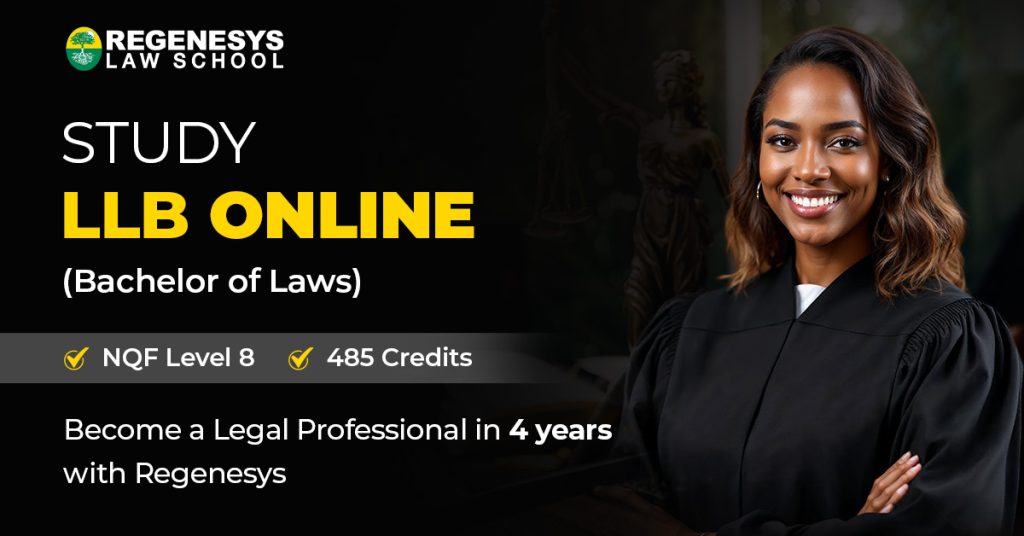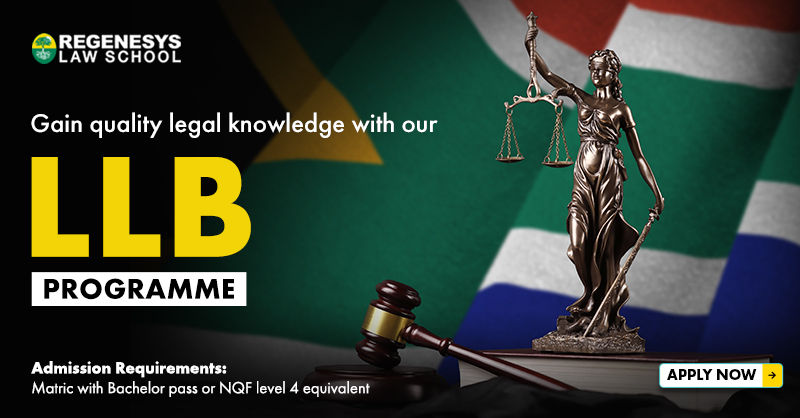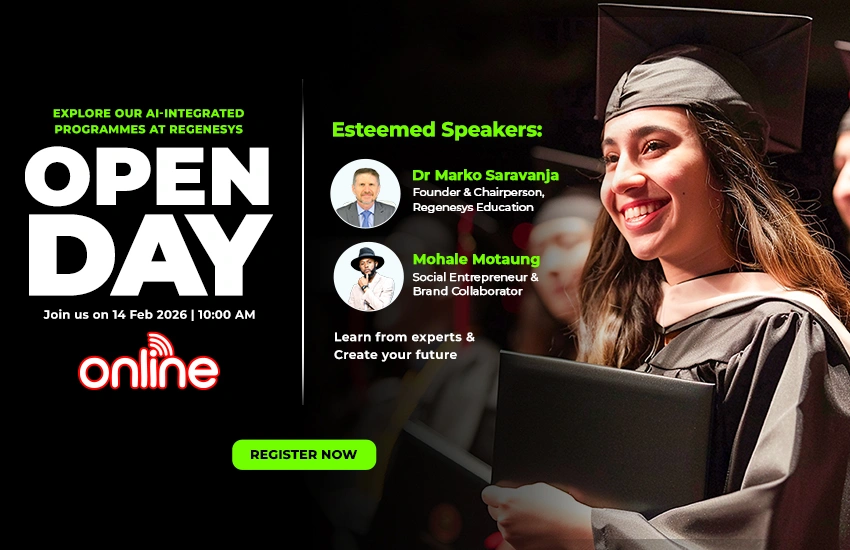A Bachelor of Laws (LLB) remains one of South Africa’s most sought‑after professional legal qualifications. As legal frameworks evolve amid increasing business and regulatory complexities, demand for competent law graduates continues to grow. Individuals from various backgrounds, school leavers, mature professionals, or those shifting careers, are drawn to the credibility and versatility that an LLB offers.
In this article, we will provide an overview of the LLB guide South Africa, which will include admission criteria, study modes, curriculum, career options, salary expectations, finance and how Regenesys empowers learners to earn an LLB with confidence.
Table of Contents
- What Is an LLB?
- Admission Requirements
- Study Modes: Full‑Time, Part‑Time, and Online
- What You Will Study: Core and Elective LLB Subjects
- How Many Modules Are in an LLB?
- Career Paths After an LLB
- Salary Expectations for LLB Graduates
- Financial Considerations
- Why Is Regenesys a Recommended Choice?
- Conclusion
- LLB guide South Africa – FAQ
What Is an LLB?
Students who are sceptical about what a law degree entails, will benefit from this LLB guide South Africa. A Bachelor of Laws (LLB) is the foundational legal qualification required to practise law in South Africa. It serves as a direct route into the legal profession and provides a solid grounding in constitutional, criminal, civil, and commercial law.
The degree is structured to develop both theoretical knowledge and practical skills, such as legal reasoning, research, writing, and ethics, that are critical in legal and corporate settings.
In South Africa, the LLB is recognised at NQF Level 8, and it typically spans four years of full-time study. Part-time and distance learning options may extend this duration, making it more accessible to those balancing work and family commitments. The qualification is designed to equip students not only for traditional legal careers such as attorney or advocate but also for roles in governance, compliance, public policy, and corporate regulation.
A strong LLB programme, such as the one offered by Regenesys Law School, emphasises academic excellence, practical application, and the flexibility needed to succeed in the competitive landscape.
Read more onEssential Guide To Pursue LLB Degree in South Africa here!

Admission Requirements
Starting your legal education requires a clear understanding of the eligibility criteria. In South Africa, admission into an LLB programme typically requires a National Senior Certificate (NSC) with a Bachelor’s pass. English is a core requirement, as strong language proficiency is vital for legal writing, reasoning, and argumentation, which are skills central to succeeding in any law subject.
Applicants who wish to study law part-time or full-time must ensure they meet the basic entry requirements. For school leavers, a solid academic record with competence in subjects like English and Mathematical Literacy is recommended. However, the LLB guide South Africa also recognises that many students are returning to education later in life.
Regenesys offers alternative access, allowing non-traditional learners, such as working professionals and those with prior qualifications, to gain entry. These law study options are part of Regenesys’s commitment to accessible, inclusive education.
Listed below in this LLB guide South Africa are the requirements for admission for the Regenesys programme:
- Matric with Bachelor pass or NQF level 4 equivalent qualification
- English 1st – 50% | English 2nd – 60%
- A levels for International students (Africa)
- Higher level pass for international students 26 APS
- Competent in Mathematics, English, written and oral communication skills at NQF Level 4
- Basic computer skills, internet connection and relevant IT resources
Read more on What You Need to Know About South African LLB Law Admission Requirements here!
Study Modes: Full‑Time, Part‑Time, and Online
One of the most valuable aspects of any LLB guide South Africa is the understanding of the various law study options that are available. At Regenesys, students can choose to study law through contact classes or online, without compromising on academic standards or career outcomes.
The Regenesys LLB programme is accredited by the Council on Higher Education (CHE) and registered with the South African Qualifications Authority (SAQA), ensuring that both online and contact learners receive the same high-quality legal education. Whether you’re just out of school or balancing a job and family life, you can pursue a law qualification through a mode that suits your schedule and personal commitments.
Regardless of the mode you select, you will follow the same curriculum, cover the same law subjects, and gain access to the same assessments, resources, and qualifications. Regenesys’s online delivery is especially designed for modern learners, offering digital flexibility without sacrificing personal attention or academic rigour.
The table below in this LLB guide South Africa outlines the differences between the Regenesys contact and online learning options:
|
Aspect |
Contact Classes |
Online Classes |
|
Delivery Mode |
In-person, campus-based sessions |
Fully virtual, with live and recorded classes |
|
Ideal For |
High school graduates, full-time students, or those preferring face-to-face learning |
Working professionals, remote learners, or those needing flexibility |
|
Schedule |
Fixed timetable with weekday or weekend classes |
Flexible schedules with asynchronous access and live sessions |
|
Interaction |
Direct classroom engagement with lecturers and peers |
Interactive online platforms with real-time discussion, Q&A, and academic support |
|
Resources |
Printed and digital learning materials |
Digital resources, downloadable materials, and virtual library access |
|
Campus Access |
On-site facilities, events, and student services |
No physical attendance required – study from anywhere |
|
Qualification |
Accredited Bachelor of Laws |
Accredited Bachelor of Laws |
Read more on Can I Study LLB Part-Time? A Guide for Working Professionals in the Legal Field here!
What You Will Study: Core and Elective LLB Subjects
As part of a well-structured LLB guide South Africa, understanding what you will study during your degree is crucial. The Regenesys LLB programme is designed to develop a deep understanding of South African law while cultivating analytical, research, and problem-solving skills that are highly transferable across sectors.
The qualification consists of 485 credits and is typically completed over four years on a full-time basis. Students follow the same academic structure and learning outcomes via contact or online delivery. The programme includes a combination of core law subjects and elective modules that allow for areas of specialisation.
From the LLB guide South Africa, the table below lists the law subjects that LLB students cover when they enrol for the Regenesys Bachelor of Laws programme:
|
Year |
Semester 1 |
Semester 2 |
Electives (Choose Any 2) |
|
Year 1 |
Computer Literacy Law of Persons Legal English Pillars of South African Law 1 Foundational Personal Mastery |
Computer Literacy (Legal Research) Emotional and Spiritual Intelligence Pillars of South African Law 2 |
Business Management Economics Financial Accounting |
|
Year 2 |
Constitutional Law Jurisprudence Law of Contract 1 Roman Law |
Bill of Rights Law of Contract 2 – Specific Contracts Legal Interpretation Legal Pluralism Patent and Copyright Law |
– |
|
Year 3 |
International Law Intellectual Property Law Law of Evidence Law of Business Entities |
Administrative Law Introduction to Tax Law Law of Evidence 2 Law of Property Research Methodology |
– |
|
Year 4 |
Criminal Law 1 Law of Civil Procedures 1 Law of Criminal Procedures 1 Legal Ethics and Practice |
Criminal Law 2 Law of Civil Procedures 2 Law of Criminal Procedures 2 |
Accounting for Legal Practice Deceased Estates Environmental Law Insurance Law International Business Law Medical Law |
How Many Modules Are in an LLB?
Following the detailed overview of core and elective subjects, it is helpful to understand the overall structure and module count of an LLB programme in South Africa. Typically, an LLB comprises 36 to 40 modules spread over four years, though the exact number may vary depending on the university, elective choices, and study mode.
The programme is carefully structured to balance core legal disciplines, which provide foundational knowledge, with elective modules that allow students to explore areas of personal or professional interest. This ensures graduates develop both a broad understanding of law and specialised expertise in chosen fields.
- Core modules cover key legal areas such as Constitutional Law, Criminal Law, Contract Law, Labour Law, and Legal Ethics, forming the backbone of the qualification.
- Elective modules offer opportunities to focus on contemporary and specialised topics such as Cyber Law, Environmental Law, Intellectual Property, or International Business Law.
Overall, the LLB curriculum is designed to equip students with a combination of theoretical knowledge, analytical skills, and practical competencies. By completing the full set of modules, graduates are prepared not only for traditional legal roles but also for careers in compliance, governance, corporate advisory, and other sectors that value legal expertise.

Career Paths After an LLB
One of the most exciting aspects of pursuing legal education is the wide range of LLB careers in South Africa available to graduates. A strong LLB programme – like the one offered by Regenesys – prepares students not only for courtroom roles but also for positions in business, government, media, and academia. Whether you are interested in legal practice or non-traditional paths, this LLB guide South Africa will introduce you to diverse professional outcomes.
Upon completing the degree, graduates gain access to structured career tracks in the legal system, as well as flexible options in corporate, research, and advisory environments. Listed below in this LLB guide South Africa are some LLB careers in South Africa that graduates can explore:
1. Legal Assistant
Supports attorneys or advocates with document preparation, legal correspondence, and case management.
2. Legal Researcher
Works with law firms, think tanks, or government institutions to research statutes, case law, and policy trends
3. Legal Adviser
Offers internal legal support to businesses or organisations, especially in regulatory compliance and risk management.
4. Legal Journalist
Combines legal knowledge with media skills to report on court cases, legislative developments, and legal reforms.
5. Assistant Prosecution Officer
Provides assistance in criminal proceedings, helping public prosecutors with case preparation and investigation.
Read more on LLB Career Advantages: Benefits of Holding an LLB Degree
Salary Expectations for LLB Graduates
An important part of any LLB guide South Africa is understanding the earning potential that comes with completing an LLB programme. The legal profession offers competitive salaries, with variations depending on the role, level of experience, location, and sector.
As of June 2025, data from World Salaries indicates that lawyers in South Africa earn an average annual income of R725,700, which translates to approximately R60,475 per month. Entry-level professionals typically start at around R357,300 per year, while senior or specialised legal professionals can exceed R1,000,000 annually.
The table below outlines the average earnings for various LLB careers in South Africa, based on June 2025 national data gathered from various sources:
|
Job Roles |
Average Annual Income |
|
Law Professor |
R809,043 |
|
Legal Researcher |
R388,214 |
|
Legal Adviser |
R467,934 |
|
Prosecutor |
R935,689 |
Several factors influence LLB graduate earnings, including:
- Area of specialisation (e.g., criminal law, corporate law, human rights)
- Years of experience and qualifications
- Type of employer (government, private firm, NGO, or corporate)
- Geographic location (urban centres often offer higher salaries)
Read more on What Comes After LLB? Exploring Career Paths and Opportunities
Financial Considerations
One of the most practical concerns covered in any reliable LLB guide South Africa is how to finance your legal education. While the long-term return on investment in an LLB programme is promising, it’s essential for prospective students to understand the financial commitment involved and the funding options available.
The cost of studying law includes not just tuition fees, but also expenses related to textbooks, digital tools, internet access, and daily living costs, depending on the study format.
Regenesys recognises the financial challenges faced by many South African students and offers a range of support mechanisms to make our LLB programme more accessible. Listed below in this LLB guide South Africa are the options available to Regenesys LLB students to help finance their education:
1. Student Loans
Regenesys partners with reputable finance providers like Student Hero, Fundi, Capitec, and Nedbank to offer student loan options that can help cover the cost of tuition. These funding solutions often include flexible repayment terms, extended loan periods, and competitive interest rates, allowing students to better manage their education costs.
2. Flexible Payment Plans
Additionally, students can opt for interest-free monthly instalments spread across the academic year. This option is ideal for working students who wish to study law part-time while maintaining a regular income.
Why Is Regenesys a Recommended Choice?
One of the most critical decisions covered in a higher education journey is selecting where to pursue your legal studies. With numerous institutions offering law qualifications, it is essential to evaluate your options carefully to ensure the LLB programme you choose is credible, flexible, and aligned with your long-term goals.
Prospective students should evaluate various factors, some of which are listed below in this LLB Guide South Africa:
Regenesys offers a modern, future-focused legal education aligned with today’s professional realities. Here’s why it’s highlighted in this LLB guide South Africa as a top-tier option:
- CHE-accredited and SAQA-registered LLB programme, assuring national recognition and academic credibility.
- Flexible study through contact or online delivery, accommodating school leavers, working professionals, and remote learners.
- A comprehensive, career-focused curriculum covering all key law subjects, practical skills, and electives.
- Affordable study with access to student loans and flexible payment plans via the Regenesys financial support services.
- Real-time academic and peer support for both online and in-person students, ensuring no compromise in learning quality.

Conclusion
The LLB guide South Africa highlights a rewarding path that fosters critical thinking, leadership, and compliance in the demanding legal sphere. With multiple study modes, diverse subjects, and strong career prospects, an LLB remains a versatile qualification.
Completing an LLB degree in South Africa, helps prepare graduates for law careers in various specialisations. Regenesys stands ready to provide the flexibility, support, and quality students need to finish their LLB and pursue a legal or business career.
Visit the Regenesys Law School website to gain the complete LLB programme details SA, and take the next step.
LLB guide South Africa – FAQ
What is the duration of the LLB programme in South Africa?
The standard LLB duration in South Africa is four years for full-time study. However, part-time or online students may take up to six years, depending on their pace and personal commitments.
Can I study law part-time while working?
Regenesys offers flexible study options, which allow working professionals to balance their studies with employment and personal obligations while accessing the same accredited LLB programme as contact learning students.
What subjects are included in the Regenesys LLB?
The Regenesys LLB curriculum covers core law subjects such as Constitutional Law, Criminal Law, Family Law, and Contract Law. Electives include areas like Labour Law, Environmental Law, and Cyber Law, ensuring graduates are prepared for a wide range of LLB opportunities.
What are the admission requirements for the Regenesys LLB?
To enrol, you need a National Senior Certificate (NSC) with a Bachelor pass. English proficiency is mandatory. Regenesys also recognises Recognition of Prior Learning (RPL) for mature students or those with previous qualifications, making legal education accessible to a diverse range of applicants.
What career paths are available after completing an LLB?
Graduates can pursue several LLB careers in South Africa, including roles such as Legal Adviser, Legal Researcher, Prosecutor, Assistant Prosecution Officer, and Legal Journalist.







